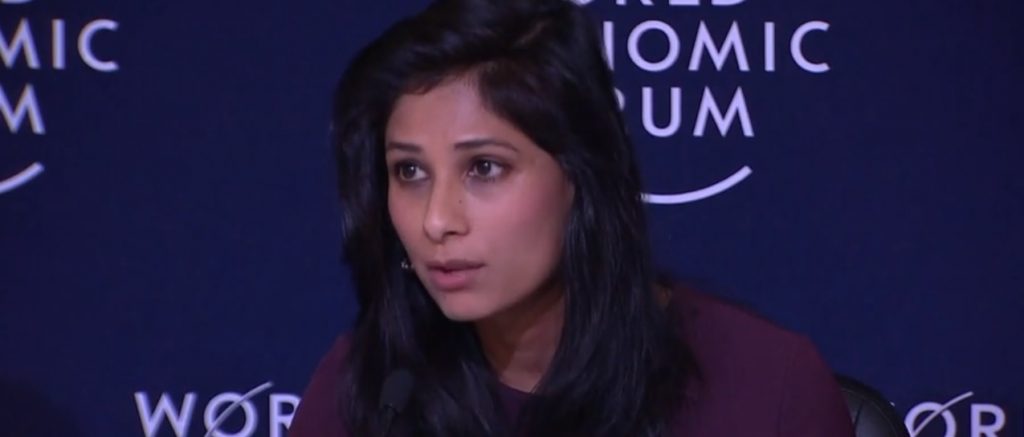São Paulo – Although global economic growth in 2018 remained close to post-crisis highs, global expansion is weakening, according to International Monetary Fund (IMF) economic counsellor and director of Research Gita Gopinath (pictured). And this is happening somewhat faster than expected, the economist pointed out in an IMF press release.
This Monday (21) saw the Fund – which is currently gathered for the World Economic Forum in Davos, Switzerland make public its revised World Economic Outlook (WEO) forecasts. The IMF expects 3.5% growth in 2019, down 0.2% from the previous forecast. In 2020, the Fund believes the world economy will expand by 3.6%, down 0.1 percentage point from October 2018. “The downward revisions are modest; however, we believe the risks to more significant downward corrections are rising. While financial markets in advanced economies appeared to be decoupled from trade tensions for much of 2018, the two have become intertwined more recently, tightening financial conditions and escalating the risks to global growth,” Gopinath was quoted by the IMF as saying.
According to the director, forecasts regarding developed economies have been revised down slightly mostly as a consequence of worsening Euro Zone forecasts. Here, the most relevant revisions are Germany’s, where auto industry production issues and weaker external demand will weigh on growth in 2019, and Italy’s, where sovereign and financial risks are expected to stifle growth.
Chief concerns for the IMF include an expected escalation of trade tensions and a deterioration of financial conditions. “Higher trade uncertainty will further dampen investment and disrupt global supply chains,” said Gita Gopinath.
The economist covered issues including the slowdown of growth in China, which could be more pronounced than expected, especially if trade tensions should persist, which might trigger abrupt sell-offs in financial and commodity markets similar to what happened in 2015/16. In Europe, there are the issues surrounding Brexit. And in the United States, the protracted federal government shutdown poses downside risks. Although the country keeps growing, a slowdown is expected as fiscal stimulus unwinds.
Gopinath believes policymakers must take action now to “reverse headwinds to growth.” “The main policy priority is for countries to resolve cooperatively and quickly their trade disagreements and the resulting policy uncertainty, rather than raising harmful barriers further and destabilizing an already slowing global economy,” she said.
Latin America and Brazil
As for Latin American economies, the IMF’s only upward revision was Brazil’s, going from 1.3% in 2018 to 2.5% in 2019. The Fund said the country is likely to keep recovering from the recession of 2015/16.
Regarding Latin America, the IMF hopes growth will rebound in the next two years, from 1.1% in 2018 to 2.0% in 2019. In 2020, the Fund expects expansion to reach 2.5%. Both projections, however, changed down 0.2 percentage point from October 2018.
Middle East and Saudi Arabia
The IMF sees growth in the Middle East, North Africa, Afghanistan and Pakistan to remain moderate at 2.4% in 2019, before picking up to 3% in 2020. Key issues in the region include weak oil output growth. On the other hand, non-oil activities are seen going up in Saudi Arabia.
Translated by Gabriel Pomerancblum




